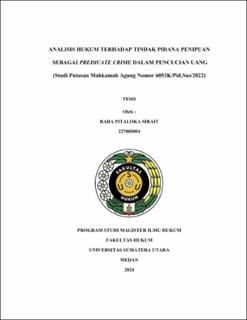Analisis Hukum terhadap Tindak Pidana Penipuan sebagai Predicate Crime dalam Pencucian Uang (Studi Putusan Mahkamah Agung Nomor 6053 K/PID.SUS/2022)
Legal Analysis of Fraud as a Predicate Crime in Money Laundering (Juridical Analysis of the Mahkamah Agung Judgement No.6053K/Pid.Sus/2022)

Date
2024Author
Sirait, Rara Pitaloka
Advisor(s)
Mulyadi, Mahmud
Alsa, Abdul Aziz
Metadata
Show full item recordAbstract
The crime of money laundering will not occur if it is not preceded by the existence of a predicate crime because the object of the crime of money laundering is the property resulting from the original crime. One of the most dominant predicate crimes that gives birth to money laundering crimes is fraud, this is based on the research results of the Financial Transaction Analysis Reporting Center (PPATK). The formulation of the problem in this study is the Formulation of the Crime of Fraud as a Predicate Crime of Money Laundering, the Role of Judges in examining and deciding cases of Money Laundering Crimes and Judges' Considerations in the Decision of the Crime of Money Laundering with the Predicate Crime of Fraud based on Decision Number 6053K/Pid.Sus/2023.
The research method used in this study is normative juridical, which is supported by primary and secondary data sources, with literature study data collection techniques, and analyzed qualitatively.
The result of this study is that the Crime of Fraud is one of the original crimes regulated in Article 2 paragraph (1) letter r of Law Number 8 of 2010 concerning the Prevention and Eradication of Money Laundering Crimes. The role of judges in examining and deciding cases of the Crime of Money Laundering based on the authority granted by law and the Panel of Judges in the Supreme Court considers by looking at juridical and non-juridical facts. The defendant's actions have fulfilled the criminal elements in Article 378 juncto Article 55 Paragraph (1) 1 of the Criminal Code (Criminal Code 1946) and Article 3 of Law Number 8 of 2010, as in the public prosecutor's indictment, therefore the defendant has been proven guilty and the conditions for criminal imposition have been met, so the defendant must be held accountable for his actions.
Collections
- Master Theses [1833]
